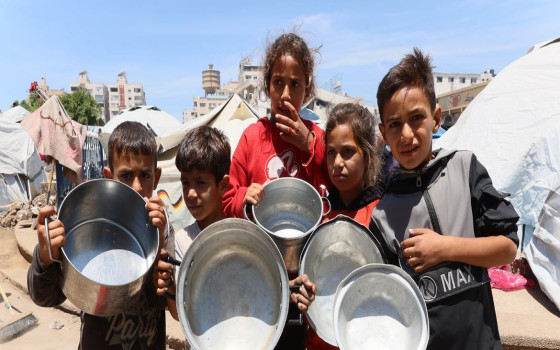
UN agencies from Gaza: Severe fuel shortages affect hospitals, bakeries, and water networks. Children go days without food, and mothers prevent them from playing to conserve energy. Warning of disease outbreaks.

- Europe and Arabs
- Sunday , 13 July 2025 6:46 AM GMT
Gaza - New York: Europe and the Arabs
UN agencies have warned that the fuel shortage in Gaza has reached critical levels, noting that fuel is the lifeblood of the Strip, powering hospitals, water and sewage networks, ambulances, and all aspects of humanitarian operations.
This came in a joint statement issued by the United Nations Office for the Coordination of Humanitarian Affairs, the United Nations Development Programme, the United Nations Population Fund, the United Nations Office for Project Services, the United Nations Relief and Works Agency for Palestine Refugees in the Near East (UNRWA), the World Food Programme, and the World Health Organization.
The UN agencies said in their statement that fuel supplies are essential for moving the fleet transporting essential goods through the Strip and for operating a network of bakeries that produce fresh bread for the affected population. They warned that without fuel, these vital resources for 2.1 million people will disappear.
The agencies warned that when fuel runs out, it imposes an unbearable new burden on a population teetering on the brink of starvation. She added that without sufficient fuel, UN agencies responding to this crisis will likely be forced to completely halt their operations, directly impacting all essential services in Gaza. This means no health services, no clean water, and no ability to deliver aid.
A Threat to Humanitarian Efforts
The UN agencies also warned that without sufficient fuel, Gaza faces a collapse in humanitarian efforts, noting that hospitals are already shut down, maternity and neonatal units and intensive care are out of service, ambulances cannot move, roads and transportation will remain blocked, trapping those in need, and communications will be disrupted, hindering the coordination of life-saving efforts and isolating families from critical information and each other.
They added that without fuel, bakeries and community kitchens will be unable to operate, and water and sanitation systems will cease, leaving families without safe drinking water, while solid waste and sewage will accumulate in the streets.
The agencies said that these conditions expose families to deadly disease outbreaks and push the most vulnerable in Gaza closer to death. UN agencies reported that for the first time in 130 days, a small amount of fuel entered Gaza this week. This is a welcome development, but it is a small fraction of what is needed daily to maintain life and vital relief operations.
They explained that UN agencies and humanitarian partners cannot overstate the urgency of this moment, as fuel must be allowed into Gaza in sufficient quantities and on a sustained basis to support life-saving operations.
Karl Skau, Deputy Executive Director of the World Food Programme, warned that the humanitarian situation in Gaza has reached an unprecedented level of deterioration, with the entire population of the Strip food insecure and some 500,000 people facing severe hunger, amid seriously restricted humanitarian access.
Karl Skau spoke to reporters in New York following a visit to Gaza. He told reporters: "The bottom line is that the situation is worse than I have ever seen it before, in two ways: First, the humanitarian needs are higher than ever. But also, our ability to respond and assist is more constrained than ever." The UN official referred to the Integrated Food Security Phase Classification report released a few weeks ago, which indicated that the entire population is suffering from severe food insecurity, and that 500,000 people are suffering from extreme hunger.
Skau said that the situation has not improved since the report was published; on the contrary, it has become much worse now. He explained that malnutrition is worsening, citing UNICEF statistics indicating that 90,000 children are now in urgent need of treatment for malnutrition, and that one in three people in Gaza goes days without eating anything.
He added: "I met many of these families who told me that their children go days without eating at all, but on the days they do eat, they often eat hot soup with a meager handful of lentils or a few pieces of pasta. Mothers told me how they try to prevent children from playing so they don't consume more energy than can be provided by food."
Carl Skau explained that the fact that people are now dying every day trying to access food is the clearest example of how desperate the situation is.












No Comments Found